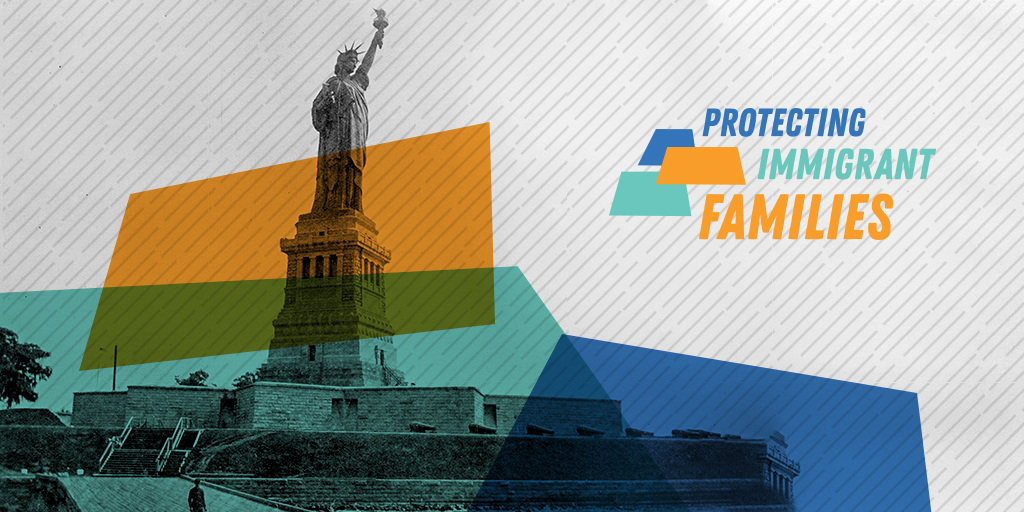Submit Your "Public Charge" Comments By Dec. 10, 2018

WHAT IS PUBLC CHARGE?
Since the beginning of this year, we have seen our communities negatively affected by misinformation surrounding the Trump administration’s proposed public charge rule. On October 10, 2018, the Trump administration published its long-feared proposal in the federal register. As rumors of changes to the rule spread, we saw families begin to voluntarily pull back from programs that provide assistance in accessing health care, food, and housing. U.S. immigration policy has long allowed government officials to deny visas or permanent residency to immigrants who they project will become dependent on the state - or a "public charge.” Under the proposed changes to this rule, immigrants who legally access a number of social services that support hard-working, low-income immigrant families, could now also be denied a green card or refused admission to the United States. These changes are directly aimed at low-income, non-English speaking immigrants and are intended to make it harder for low income immigrants to be reunited with their family members and block their path to residency.
POTENTIAL IMPACT OF RULE CHANGE
The impact of this rule change if it were adopted would be devastating to many low income immigrants and their families. However, because of misinformation, just the possibility of this change is already having a “chilling effect” on vast number of immigrants who would not be affected by the rule change. In other words, low-income immigrants are already avoiding services needed for the health and well-being of their families out of fear. Experts project a substantial chilling effect – those that may drop or not apply for benefits because they believe they will be affected by the new rule -- of 25 million people currently living in the US. The majority of those to be impacted would be US citizen children, who account for a quarter of all U.S. children.
The impact of the proposed change goes beyond social and moral ramifications. It also has the potential for a tremendous economic impact. According to the Fiscal Policy Institute, a 25% disenrollment from programs immigrants are otherwise qualified to receive would result in:
- $12 billion loss of federal funds in supports to families across the country
- A negative ripple effect through the economy of about $24 billion
- Approximate loss of 164,000 jobs
While Latino and other immigrants make significant contributions to the economy, many continue to struggle to get their basic needs met. Many of the programs targeted by this rule have helped millions of Latinos lift themselves out of poverty:
- 21% of Latino households received SNAP in the last year
- Approximately 32% of Latinos are covered by Medicaid
- About 740,000 Latino households received federal rental assistance in 2015
HOW CAN WE FIGHT THIS?
One major thing we must remember is that the rule has not gone into effect! The existing public charge guidance is still in place until a new rule is finalized. We must do everything in our power to fight this rule change and protect our community. We can still fight this! The federal government is accepting comments to this proposed rule until December 10, 2018. Under the rulemaking process, the government must respond to all comments received. Our members, clients, and students are counting on us to submit organizational comments to stop this rule from becoming final. Your comment has the power to slow down the rulemaking process and help shape any rule change that may occur to protect immigrant families.
INFORMATION & RESOURCES
For individuals:
- Make the comments your own
- If you are an expert, highlight your qualifications
- If you are a concerned individual, highlight why you care
- Include a relevant personal story — your own or someone else’s (if you use their name, get permission) about how the rule will affect your ability to work and provide for yourself or your family
- Highlight relevant data and research
- Provide a translation of non-English comments
For organizations:
- Please note that identical comments are counted as one comment. For example, if 10 organizations sign onto a comment, that is counted as one comment. If agency A and agency B submit identical comments separately, those are counted as one comment. It is recommended that at least 30% of the comment is unique material.
- Comment templates are meant to provide information, but you have a powerful story to tell. Modify the comments to include information about your organization, clients, and share your organization’s perspective on how the proposed rule would impact your community.
- Comments must be relevant to be considered. Your comments should explain how taking away the ability to use these public services would harm your organizational members and community
HOW TO SUBMIT YOUR COMMENTS
Click on any of these links to submit your comments:
- Protecting Immigrant Families (Especially helpful for individual comments)
- Our American Story: Faith Traditions; Welcome Immigrants; Protecting Health; Helping Children Thrive (Great for submitting individual comments)
- Catholic Legal immigration Network
- FRAC Model Comments for Anti-Hunger/Nutrition Groups
Online:
Visit the federal public charge comment portal at regulations.gov. Click on “comment now” and either enter your comment in the text box (must be fewer than 5000 characters) or upload your comments as a PDF.
Mail:
Samantha Deshommes, Office of Policy and Strategy
U.S. Citizenship and Immigration Services, Department of Homeland Security
20 Massachusetts Avenue, NW
Washington, DC 20529-2140
ADDITIONAL RESOURCES
- Hispanic Federation Powerpoint Presentation on Public Charge Proposed Rule Change
- Protecting Immigrant Families
- Public Charge Proposed Rule: Potentially Chilled Population Data Dashboard
- FPI: A Data Table with Economic and Fiscal Impact Calculations for All 50 States
- FPI: The National Report

